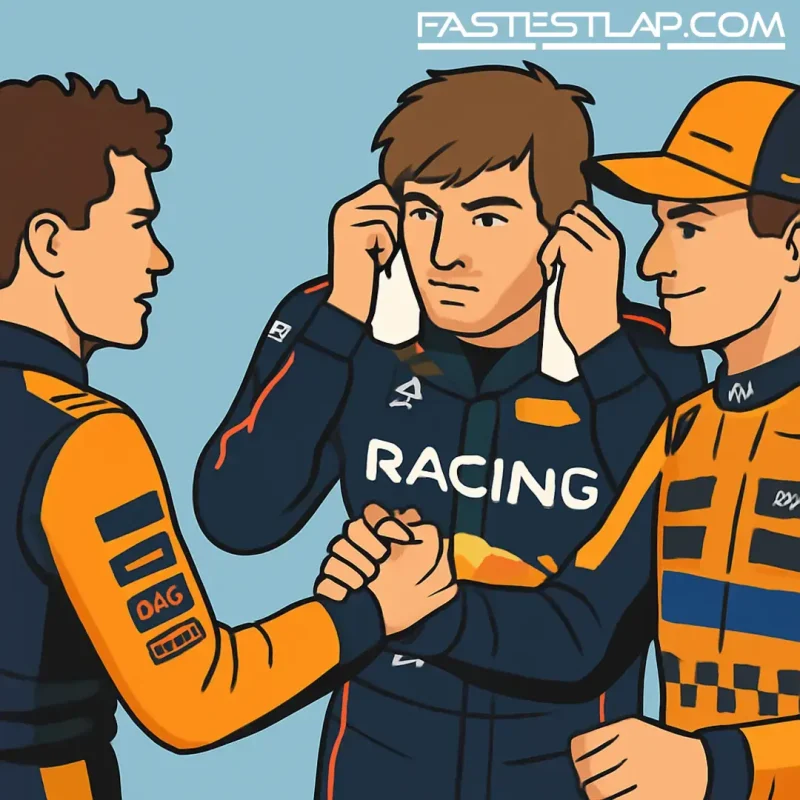Max, the middleman: how McLaren’s two-front war is turning Verstappen into the title decider
For months McLaren swore by a simple creed: let the maths do the talking. No favourites, no early calls, just two drivers unleashed until a calculator says otherwise. Noble idea. Also the sort of plan that tends to produce one very happy Red Bull driver.
Because while Woking held its nerve, Max Verstappen found his. Since the Dutch Grand Prix — when Oscar Piastri had the table set, Lando Norris was in striking distance and Verstappen was supposedly receding in the mirrors — the picture has shifted, sharply. The triple-digit gulf to Piastri shrank to something uncomfortably close, and the buffer to Norris went with it. Max didn’t just stop the bleeding; he put the tourniquet on the entire championship.
It’s not that McLaren suddenly forgot how to score. But Piastri’s purple patch took a hit with a couple of bruising weekends, including a first-lap exit in Baku and Sprint chaos in Austin. Norris banked steadily, as he does, but Verstappen’s run — a blur of wins, a second place and a Sprint victory — hoovered up almost everything in sight. Title campaigns often hinge on a four-race weather front; this one just blew in from Milton Keynes.
So here’s the dilemma, presented in papaya. McLaren’s line remains: no team orders until one of the drivers is mathematically out. Andrea Stella even invoked 2007 and 2010, those fever-dream finales where the “third” man stole it at the last. Translation: we’re not closing any doors. The subtext: we know exactly who walks through if we do.
Which brings us to the noise around the edges. McLaren’s been accused — loudly and often — of leaning subtly toward Norris. You could circle a few flashpoints. Monza’s swap-back after a pit stop tangle, where Piastri ceded P2. Singapore, when Norris hit his teammate and stayed ahead with no on-the-day team orders. The team insists the playing field’s level; Piastri has publicly said he’s happy with how it’s run. But when Zak Brown was asked in Austin about any internal sanction for Singapore, he called it “private business between us,” adding it was a “pretty minor situation” with a “pretty minor consequence.”
Minor consequence? That’s candy floss for the conspiracy theorists. Without clarity, fans will write their own stewards’ notes.
Enter Bernie Ecclestone, never one to resist a grenade with the pin half-pulled. His view is blunt: McLaren’s signals point to Norris as the preferred champion, and that misreads the room. Do that, he says, and Max becomes the “laughing third” who pockets the big trophy in Abu Dhabi. Strip away the theatrics and there’s a kernel of cold truth there — split your attention, and Verstappen’s singular focus will punish you.
None of this is to say McLaren’s wrong. Two quick cars and two title-capable drivers is the stuff team bosses dream about. But split strategies and split priorities can be costly when the rival camp is built, unapologetically, around one spearhead. Think pit priority on a knife-edge Safety Car. Think who gets the undercut when both are marginal on tyres. Think who burns the extra engine miles on a Friday to find a quali sweet spot. Do that for two and you often dilute both.
The irony is McLaren’s “let them race” ethos has been their superpower all year — pushing both drivers to a higher ceiling, harvesting huge Constructors’ points, and keeping the garage harmonious enough to stay dangerous. But as the calendar winds toward its desert epilogue, ideals and arithmetic tend to collide. Titles are won by seconds and split-second calls. They’re also lost by a team trying to be scrupulously fair while the other lot are ruthlessly efficient.
Verstappen has made a career out of living in that gap. When his opposition hesitate, he goes. When they play the long game, he flips the board in four laps. If McLaren stick to their line and let the sums run, they might wake up on Sunday night in Abu Dhabi admiring their ethics — and watching someone else lift the silverware.
Maybe Stella’s right and history repeats: the “third” man in the points swoops late. If so, the cautionary tale will be written in papaya and the punchline in navy blue. There’s still time for McLaren to pick a lane, or to execute the perfect two-car ballet right up to the flag. But that requires absolute clarity in the moments that matter.
The season tightened because Verstappen turned relentless again just as McLaren’s margins thinned. Now the pressure test is simple. Keep the door open, and Max will walk through it. Slam it shut for one of your own, and you might just keep him on the porch.
The maths, as ever, won’t care how it looks. The paddock will. And so will the driver on the other side of the garage, whichever way McLaren swings.




